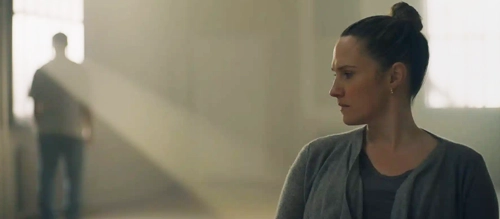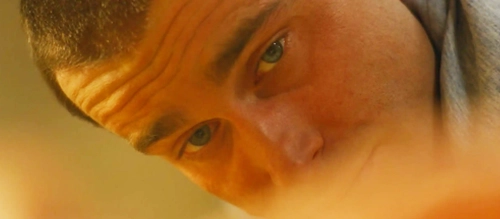Embers (2023) Review

Embers (2023)
Director: Christian Cooke
Screenwriters: Dave Florez, Christian Cooke
Starring: Ruth Bradley, Christian Cooke, Clare Perkins, Samuel Anderson, David Wilmot
In order to be tense, a film does not need to be a thriller. It doesn’t need a slasher in a corner waiting to jump out at the main character in order to have the viewer filled with anticipation, shivering from head to toe. It could be a film like Embers, an independent social drama which manages right from the outset to give the feeling of a bomb about to go off at any second. Amy (Ruth Bradley) is an intimacy therapist, using physical contact (often sexual) as a form of therapy. Her boss (Helen, played by Clare Perkins) ropes her in to helping break 33 year-old Dan (Christian Cooke) out of his silent shell in a mental health ward, where he has been silent for 18 years after a crime all those years earlier.
With a brilliant central trio of performances from Bradley, Cooke, and Samuel Anderson as Amy’s boyfriend Joe, the film roots itself in the palpable tension between the characters. A premise which many would find uncomfortable at the best of times, it uses Amy’s twin relationships between her boyfriend and her patient to keep the entire film fizzling under the surface. Dan’s framing as a constant, unstable threat makes it an almost Hannibal Lecter/Clarice Starling relationship, with both films having women tasked with breaking through the exterior of dangerous criminals. Director Christian Cooke chooses not to reveal Dan’s face for quite a while, keeping the underlying potential danger brewing for as long as possible. This is the impression we hold throughout the film, and the further through we go, the more we clamp the arms of the seat. When combined with Isobel Waller-Bridge’s tremolo score burbling like a stream underneath a house, one can’t help but to feel under threat.
Yet it’s not all knuckle-biting tension. It is in many ways a look at views of mental health issues from those who haven’t experienced it themselves. Pressure from government organisations who don’t really know what they’re doing but need to make themselves look good puts those who have expertise under pressure to perform, and when most psychiatry and therapy is, at best, working from educated guesses where everyone responds in different ways to different stimuli, it piles on the workload for Amy beautifully. Several scenes showing her trying different methods to engage with Dan is a welcome display of both enthusiasm and desperation. Mental health issues, and severe ones at that, don’t do well with deadlines, and Embers does a good job at highlighting the stupidity of this viewpoint which still pervades in society today.

The third act isn’t as strong as the first two, where some rash decisions are narratively predictable to a film-literate audience, but not completely out of keeping with the foolishness of human nature. We knew some of the final scenes were always coming, but the film does a decent enough job of putting moments in throughout the film to try and cover its back. It’s not perfect, but the point is at least argued. Additionally, Dan’s final revelations are good changes from the usual way his character might have been written, his backstory highlighting once again the prejudices that can be placed upon the severely traumatised. It’s not perfect, and a drop off from the opening two thirds, but it doesn’t tank the picture.
In a way, the film is as much focused on curing us as an audience as it about Dan, trying to break down the barriers to our understanding of therapy and mental illness as much as breaking into Dan’s isolated world. On a fairly small budget – only a few main locations, a few characters, and everything kept nice and intimate – it is wonderful how much it achieves with so little. Plenty have done far worse with far more. It’s a short, sharp shock that lingers in the mind long after the credits roll.
Score: 19/24

